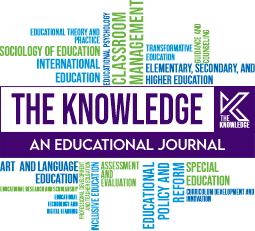University Teachers ’Attitudes Towards Creativity: A Case Study of the University of Loralai
DOI:
https://doi.org/10.63062/tk/2k23a.25806Keywords:
University Teachers’ Attitudes, Creative Thinking, Creative Practices, CreativityAbstract
Instructors carry out a crucial role when they foster creativity in both their students and their classes. Therefore, the purpose of this study is to investigate how university professors view innovation. It was the University of Loralai case study. There were twenty-five university teachers (18 men and 07 women) who were selected at random from the University of Loralai in Balochistan. The research design employed in the study was a descriptive survey, with Likert's five-point questionnaire serving as the data-gathering tool. Two sections of the questionnaire were distributed: one for the study and one for the demographics. The study section examined the attitudes of teachers toward creativity, whereas the demographic section contained information about the teachers. Age, gender, religion, place of residence, province, education, and prior teaching experience were among the demographic factors that were measured. The Al-Nouh et al. scale was employed by the current researchers to look at the mean value of the attitudes of university lecturers (2014). Teachers' views about creativity were categorized into three categories for simplicity of analysis: high, medium, and low (Al-Nouh et al., 2014). Results of the current study showed that University of Loralai teachers’ attitudes towards creativity were high because the mean value was 3.82. According to the scale of Al-Nouh. et al. (2014), this mean value, i.e., 3.82, falls in the category of high mean. Thus, overall, the University of Loralai teachers’ attitudes towards creativity were high. It is concluded through this research that University of Loralai teachers had positive attitudes and opinions toward creativity. Implications and recommendations for future researchers have been discussed
References
Akkanat, Ç., & Gökdere, M. (2015). Chemistry Teachers’ Views of Creativity. Asia-Pacific Forum on Science Learning and Teaching, 16(1), 1–21. https://www.eduhk.hk/apfslt/download/v16_issue1_files/gokdere.pdf
ALJUGHAIMAN, A., & MOWRER-REYNOLDS, E. (2005). Teachers' conceptions of creativity and creative students. The Journal of Creative Behavior, 39(1), 17-34. https://doi.org/10.1002/j.2162-6057.2005.tb01247.x
Al-Nouh, N. A., Abdul-Kareem, M. M., & Taqi, H. A. (2014). Primary school EFL teachers’ attitudes towards creativity and their perceptions of practice. English Language Teaching, 7(9), 74-90. https://doi.org/10.5539/elt.v7n9p74
Banaji, S., Burn, A., & Buckingham, D. (2006). Rhetoric of creativity: a review of the literature. http://eprints.lse.ac.uk/id/eprint/27114
Bolden, D. S., Harries, T. V., & Newton, D. P. (2009). Pre-service primary teachers’ conceptions of creativity in mathematics. Educational Studies in Mathematics, 73(2), 143-157. https://doi.org/10.1007/s10649-009-9207-z
Chan, S., & Yuen, M. (2013). Teachers’ beliefs and practices for nurturing creativity in students. Gifted Education International, 31(3), 200-213. https://doi.org/10.1177/0261429413511884
Craft, A., Jeffrey, B., & Liebling, M. (2001). Creativity in education. London: Continuum.
Craft, A. (2003). The limits to creativity in education: Dilemmas for the educator. British Journal of Educational Studies, 51(2), 113-127. https://doi.org/10.1111/1467-8527.t01-1-00229
Diakidoy, I. N., & Kanari, E. (1999). Student teachers’ beliefs about creativity. British Educational Research Journal, 25(2), 225-243. https://doi.org/10.1080/0141192990250206
EC (2009). European Ambassadors Manifesto.
EC (2010a). Europe 2020. A strategy for smart, sustainable and inclusive growth.
Eisenhart, M. A., Shrum, J. L., Harding, J. R., & Cuthbert, A. M. (1988). Teacher beliefs. Educational Policy, 2(1), 51-70. https://doi.org/10.1177/0895904888002001004
Gibson, H. (2005). What creativity isn't: The presumptions of instrumental and individual justifications for creativity in education. British Journal of Educational Studies, 53(2), 148-167. https://doi.org/10.1111/j.1467-8527.2005.00288.x
Hashweh, M. Z. (1996). Effects of science teachers' epistemological beliefs in teaching. Journal of Research in Science Teaching, 33(1), 47-63. https://doi.org/10.1002/(sici)1098-2736(199601)33:1<47::aid-tea3>3.0.co;2-p
Hong, M., & Kang, N. (2009). South Korean and the us secondary school science teachers’ conceptions of creativity and teaching for creativity. International Journal of Science and Mathematics Education, 8(5), 821-843. https://doi.org/10.1007/s10763-009-9188-5
Kwang, N. A., & Smith, I. (2004). The paradox of promoting creativity in the Asian classroom: An empirical investigation. Genetic, Social, and General Psychology Monographs, 130(4), 307-332. https://doi.org/10.3200/mono.130.4.307-332
Ndeke, G. C., Okere, M. I., & Keraro, F. N. (2015). Secondary school biology teachers’ perceptions of scientific creativity. Journal of Education and Learning, 5(1), 31. https://doi.org/10.5539/jel.v5n1p31
OECD (2000). Knowledge management in the learning society. Paris.
Pajares, M. F. (1992). Teachers’ beliefs and educational research: Cleaning up a messy construct. Review of Educational Research, 62(3), 307-332. https://doi.org/10.3102/00346543062003307
Park, S., Lee, S., Oliver, J. S., & Cramond, B. (2006). Changes in Korean science teachers' perceptions of creativity and science teaching after participating in an overseas professional development program. Journal of Science Teacher Education, 17(1), 37-64. https://doi.org/10.1007/s10972-006-9009-4
Runco, M. A. (2007). Creativity: theories and themes: research, development, and practice. Amsterdam; London: Elsevier Academic Press.
Villalba, E. (Ed.). (2009). Measuring Creativity. Luxembourg: Publications Office of the European Union.
Wallace, B. (1986). Creativity: Some definitions: the creative personality; The creative process; the creative classroom. Gifted Education International, 4(2), 68-73. https://doi.org/10.1177/026142948600400202
Wolf, R. A. (2014). Defining the concept of creativity (Master's thesis, University of Twente).



